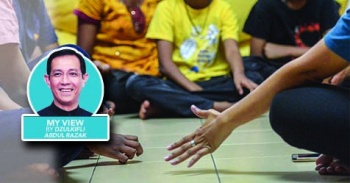Less talk, more action
Professor Tan Sri Dato' Dzulkifli Abdul Razak
My View - The Sun Daily
March 21, 2017

MANY were affected by the sombre message on child sexual abuse highlighted by four celebrities the past few weeks. The message: one in 10 children are exposed to abuse and it can affect the victim for life. The issue must be tackled with utmost urgency. There can be no two ways about it. That the issue was highlighted by celebrities from one ethnic group speaks volumes about the leadership failure of the community. Be that as it may, we need to save the situation before it gets worst like drug abuse or corruption. The failure to nip it in the bud when it appeared several years ago has turned it into a monster that breeds multiple monstrous consequences nationwide. We are about to repeat the same mistake.
What is pertinent from all these is how such issues lead to one another in cycles. It is well-known that sex-related offences are often associated with drug abuse. Those addicted to hard drugs often resort to prostitution to support their addiction regardless of age. As more youngsters fall into the trap it is expected that more of them will be entangled with the cycle of crime, including sexual ones. More so, when the corrupt provide a platform to keep the link active so that the drug-sexual abuse phenomenon remains vibrant. In Malaysia, this has been the case for more than five decades.
How do we effectively mitigate, if not eliminate, such cyclical linkages? Otherwise drug abuse, for example, will continue to proliferate among users as young as seven years based on National Anti-Drug Agency statistics. This was admitted by the deputy prime minister, who is also home minister, when he expressed concern over the abuse of drugs among the young especially in schools. Statistics from the agency showed a total of 131,841 Malaysians were listed as drug abusers from 2010 to 2016.
About this time last year, the deputy prime minister declared a renewed and intensified "war on drugs" to make Malaysia drug free. How this is to be achieved remains a mystery despite the establishment of a special court to expedite cases of drug abuse backed by loud statements. In reality it is far more effective to prevent than to prosecute. The case in point is the bizarre accident implicating a driver who drove against the flow of traffic. It was alleged that she was under the influence of a potent mental stimulant.
It is tempting to suggest that having special courts to deal with sexual abuse cases may also be disappointing especially when the crime is preventable. The news report of a medically trained person who was involved in a "sexual" episode is yet another case in point.
Now with daily reports of arrests and court cases involving corruption, it is no longer news to read how hard drugs are peddled in some prisons. It points to the weakness on the ground that largely approaches the problem in isolation.
Furthermore, the seriousness to stamp out drug abuse has never been like the fight against corruption as demonstrated lately by the MACC. While our southern neighbour is about to increase the age limit for tobacco use – widely recognised as the "gateway" to drug abuse – we are still full of hot air.
Unlike President Rodrigo Duterte of the Philippines, who is determined to fight his "war on drugs", ours is nowhere near his resolve. Regardless of how controversial it is made to be he stood by his record as a former mayor noted for making Davao (once plagued by violence and crime) into a liveable city relative to other cities in the country.
The point: Duterte walks the talk and displays leadership that delivers on his promises steadfastly and courageously. It is not just about cheap talk and image-making for public consumption while turning a blind eye to a worsening situation.
In other words, there is ample evidence to show that an indisciplined attitude breeds other social scourges and a plethora of crimes. This is our weak link that allows a vicious cycle of crimes – sexual abuse, drug abuse and corruption, to perpetuate endlessly. Only truly committed tough leadership can begin to break such a complex cycle. We simply need to talk less and do more.
